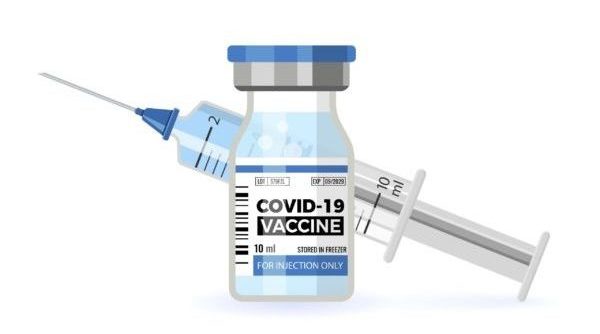At this point, over 600 million doses of the COVID-19 vaccine have been safely administered in the U.S.1
Although the COVID-19 vaccines were developed at “warp speed,” that doesn’t mean they weren’t tested rigorously.
After being evaluated in a series of clinical trials (involving tens of thousands of people), all of the COVID-19 vaccines on the market in the U.S. (think: the Pfizer, Moderna, Johnson & Johnson, and Novavax vaccines) have met the “FDA’s rigorous scientific standards for safety, effectiveness, and manufacturing quality.”2
The Safety Monitoring is Still Happening…

The COVID-19 vaccines continue to be studied and monitored to determine if they’re going to have any long-term effects on the children (and adults) who receive them. A fear of the unknown is what parents are most worried about when it comes to the COVID-19 vaccines. While it’s true that the COVID vaccines have only been studied for a few years, we can say the same about the COVID virus. For example, there’s a concern that COVID infections may have lasting effects (think: long COVID) even after a mild infection. This, too, is unknown.3
As a fellow parent, I hear these concerns. We always want to feel like we’re making the “right” decision based on “all the facts” (especially when it comes to the health & safety of our children). In the case of COVID and the COVID vaccines, there’s still some gray area. In the end, we just have to follow our guts (and the research), and adapt as we go.
Even though the COVID vaccines are “new,” vaccines in general aren’t new. Even the fancy mRNA technology that’s used in the Pfizer and Moderna COVID vaccines isn’t all that new. Researchers have been studying and working with mRNA vaccines for years (think: decades). For instance, mRNA vaccines have been studied in the past with rabies, the flu, and the Zika virus.4
Below are Some of the Vaccine Side Effects and Complications That Parents & Doctors Worry About With the COVID-19 Vaccines.
Reality Check: ALL vaccines have some side effects. Why? Because their job is to rev up our immune system and stimulate us to make antibodies against the virus being targeted. When our immune systems get triggered, symptoms can occur. Side effects commonly seen in kids who just received a COVID-19 vaccine include (but aren’t limited to):
- Soreness at the injection site.
- A fever.
- Irritability.
- Chills, muscle pain, joint pain, and chills (which can all manifest as irritability in young, non-verbal children).
- Fatigue.
- Swollen lymph nodes.
Insider Info: The above side effects are more commonly seen after the second dose of the vaccine. Remember, kids 6 months through 11 years of age are only eligible for the Pfizer and Moderna vaccines.
In Addition to the Commonly Seen Side Effects, “Adverse Events” (Read: Serious Safety Problems) Can Occur With Vaccines. These are Super Rare, Though! The Top 5 “Adverse Events” Associated With the COVID-19 Vaccines Are:
1. Anaphylaxis.
Anaphylaxis is a life-threatening allergic reaction that can cause hives, lip swelling, throat swelling, and trouble breathing. It occurs when someone is severely allergic to one of the components of the COVID-19 vaccine. If caught early enough, anaphylaxis can be reversed with injectable epinephrine (think: an EpiPen). If your child develops signs of anaphylaxis (lip swelling, throat swelling, or trouble breathing) after getting the COVID vaccine, call 911 ASAP. If your child has a known allergy and already has an EpiPen (or another form of injectable epinephrine), then give him/her a dose of it. If not, no worries, the Emergency Medical Technician (the EMT ) will administer it.
Insider Info: Anaphylaxis after a COVID-19 vaccination almost never happens. (It occurs in every 5 cases out of a million.)2 That being said, the concern for anaphylaxis is why vaccination centers and doctor’s offices ask kids (and adults) to wait in the lobby for 15 minutes after they get their COVID shot. Anaphylactic reactions tend to occur pretty quickly after being exposed to the allergen (but not always).
PediaTip: If your child has either a personal history or a family history of severe allergies, let the nurse or doctor know before he/she receives the COVID-19 vaccine.
2. Myocarditis & Pericarditis.
Myocarditis is inflammation of the heart muscle, whereas pericarditis is inflammation of the outer lining of the heart. These two adverse events have probably garnered the most attention in terms of adverse events seen in children vaccinated against COVID-19.
Most of the COVID-vaccine-related myocarditis and pericarditis cases (of which there are few) were seen with the Pfizer and Moderna vaccines and occurred in adolescent males and young adults (typically after the second dose). Fortunately, the majority of these cases resolved with rest and medications and haven’t had a lasting impact on those affected.
3. Guillain-Barré Syndrome (GBS).
Guillain-Barré Syndrome is a neurological problem characterized by muscle weakness and, at times, “ascending” paralysis (meaning the paralysis starts in the lower limbs and travels upwards to the torso and upper limbs). GBS is an autoimmune condition in which the body’s immune system damages the nerve cells of the body. This adverse effect is primarily associated with the Johnson & Johnson COVID vaccine which isn’t available to children (only individuals 18 & up can get it). In addition, GBS has primarily been reported in men 50 years & older. The good news is that the GBS due to COVID-19 vaccines is often reversible (read: NOT permanent).
4. Thrombosis With Thrombocytopenia Syndrome (TTS).
TTS is a rare adverse event that can cause blood clots OR lead to problems clotting one’s blood. As with Guillain-Barré Syndrome, TTS has mostly been seen with the Johnson & Johnson vaccine (and has occurred at a low rate of 4 cases for every million COVID shots given).5
The CDC & the FDA Use Their “Vaccine Adverse Event Reporting System” (VAERS) to Keep Track of the Adverse Reactions That Occur With the COVID-19 Vaccines.
The Bottom Line
While the mere mention of vaccine-related adverse events may cause your blood pressure to rise, remember that these events are RARE, and that the COVID-19 vaccines for children (and adults) are considered safe & effective overall.
Confident that the benefits of getting the COVID vaccine outweigh its risks, the CDC recommends that everyone 6 months & older get vaccinated against COVID. The CDC also encourages people to get the bivalent booster shot (which is hot off the presses). Kids 5 & up are eligible for Pfizer’s bivalent booster shot and kids 6 & up can get Moderna’s version of the bivalent booster shot.





